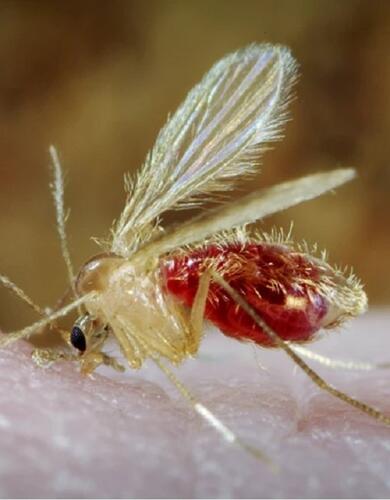Armed conflict in northern Ethiopia between 2020 and 2022 displaced huge numbers of people, driving some into refugee camps elsewhere in the country and in eastern Sudan. Aid agencies struggled to service the remote locations, and people found themselves in areas rife with visceral leishmaniasis, a parasitic disease also known as kala-azar. Now, with Sudan experiencing conflict and city dwellers fleeing to the countryside, there are concerns that history could be about to repeat itself.
In east Africa, visceral leishmaniasis is caused by a single-celled parasite called Leishmania donovani, which is transmitted through the bites of female sand flies (Phlebotomus spp.). Once inside the body, the protozoan invades immune cells. After a few months, the disease manifests as fever, anaemia and swelling of the spleen and liver. “Visceral leishmaniasis is a killer if not treated,” says Eleni Ayele, a physician at the University of Gondar in northern Ethiopia. And refugees and displaced populations in the region are especially vulnerable.
The sand flies that transmit the disease thrive in acacia forests in the border regions of Ethiopia and Sudan, and sleeping outdoors increases a person’s risk of being bitten. A bite is no guarantee of developing disease. “On average, only one out of ten persons who get the parasite into their body go on to develop the disease,” says Koert Ritmeijer, a medical scientist in Amsterdam with international aid organization Médecins Sans Frontières (MSF, also known as Doctors Without Borders). “The other nine will develop a natural immunity.” However, refugees again find themselves at a disadvantage: malnutrition during times of conflict weakens people’s immune systems, making them more susceptible to developing disease. Overcrowding in camps might also boost transmission.
“We call them less severe forms of the disease, but that is not what you are thinking if you ever sit down with infected kids and see the lesions on their skin,” says Nathan Peters, an immunologist at the University of Calgary and member of the Snyder Institute for Chronic Diseases.
University of Calgary
Although cutaneous forms of the disease, such as that caused by the Leishmania major parasites present in the region, are less often fatal than visceral leishmaniasis, the consequences are still significant. “We call them less severe forms of the disease, but that is not what you are thinking if you ever sit down with infected kids and see the lesions on their skin,” says Dr. Nathan Peters, PhD, an immunologist at the University of Calgary in Canada. The cutaneous form of the disease also proliferates in conflict zones. In 2012, an outbreak of more than 1,000 cases began in Lebanon among those fleeing violence in Syria. Since then, the disease has surged, with reports among Syrian refugees in Turkey and Jordan. Read more.


